Related Research Articles

The following outline is provided as an overview of and topical guide to theatre:

Jean-Baptiste Poquelin, known by his stage name Molière, was a French playwright, actor, and poet, widely regarded as one of the greatest writers in the French language and world literature. His extant works include comedies, farces, tragicomedies, comédie-ballets, and more. His plays have been translated into every major living language and are performed at the Comédie-Française more often than those of any other playwright today. His influence is such that the French language is often referred to as the "language of Molière".

An amphitheatre or amphitheater is an open-air venue used for entertainment, performances, and sports. The term derives from the ancient Greek ἀμφιθέατρον, from ἀμφί, meaning "on both sides" or "around" and θέατρον, meaning "place for viewing".

An aunt is a woman who is a sibling of a parent or married to a sibling of a parent. Aunts who are related by birth are second-degree relatives. Alternate terms include auntie or aunty. Children in other cultures and families may refer to the cousins of their parents as aunt or uncle due to the age and generation gap. The word comes from Latin: amita via Old French ante and is a family relationship within an extended or immediate family.
A music(al) director or director of music is the person responsible for the musical aspects of a performance, production, or organization. This would include the artistic director and usually chief conductor of an orchestra or concert band, the director of music of a film, the director of music at a radio station, the person in charge of musical activities or the head of the music department in a school, the coordinator of the musical ensembles in a university, college, or institution, the head bandmaster of a military band, the head organist and choirmaster of a church, or an organist and master of the choristers.

The Comédie-Française or Théâtre-Français is one of the few state theatres in France. Founded in 1680, it is the oldest active theatre company in the world. Established as a French state-controlled entity in 1995, it is the only state theatre in France to have its own permanent troupe of actors. The company's primary venue is the Salle Richelieu, which is a part of the Palais-Royal complex and located at 2, Rue de Richelieu on Place André-Malraux in the 1st arrondissement of Paris.
In theatre, blocking is the precise staging of actors to facilitate the performance of a play, ballet, film or opera. Historically, the expectations of staging/blocking have changed substantially over time in Western theater. Prior to the movements toward "realism" that occurred in the 19th century, most staging used a "tableau" approach, in which a stage picture was established whenever characters entered or left the stage, ensuring that leading performers were always shown to their best advantage. In more recent times, while nothing has changed about showing leading performers to their best advantage, there have been changing cultural expectations that have made blocking/staging more complicated. There are also artistic reasons why blocking can be crucial. Through careful use of positioning on the stage, a director or performer can establish or change the significance of a scene. Different artistic principles can inform blocking, including minimalism and naturalism.
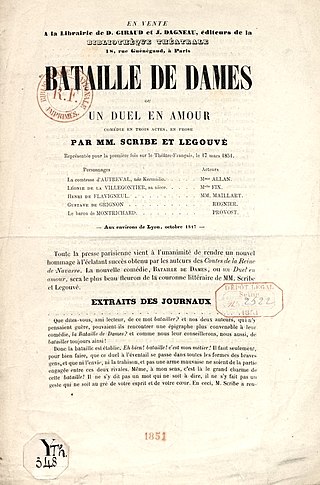
The well-made play is a dramatic genre from nineteenth-century theatre, developed by the French dramatist Eugène Scribe. It is characterised by concise plotting, compelling narrative and a largely standardised structure, with little emphasis on characterisation and intellectual ideas.
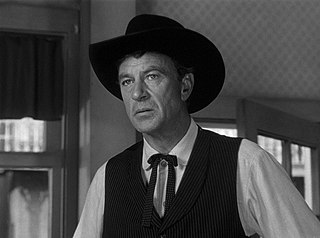
The everyman is a stock character of fiction. An ordinary and humble character, the everyman is generally a protagonist whose benign conduct fosters the audience's identification with them.
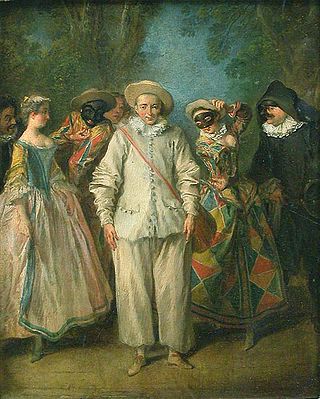
Comédie-Italienne or Théâtre-Italien are French names which have been used to refer to Italian-language theatre and opera when performed in France.

The comédie en vaudevilles was a theatrical entertainment which began in Paris towards the end of the 17th century, in which comedy was enlivened through lyrics using the melody of popular vaudeville songs.
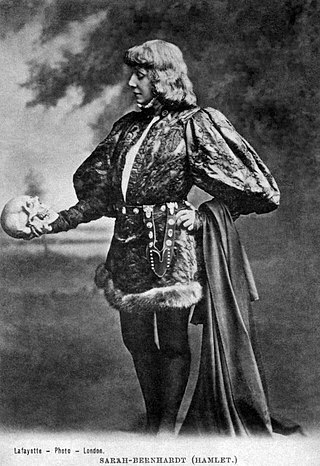
Theatre or theater is a collaborative form of performing art that uses live performers, usually actors or actresses, to present the experience of a real or imagined event before a live audience in a specific place, often a stage. The performers may communicate this experience to the audience through combinations of gesture, speech, song, music, and dance. It is the oldest form of drama, though live theatre has now been joined by modern recorded forms. Elements of art, such as painted scenery and stagecraft such as lighting are used to enhance the physicality, presence and immediacy of the experience. Places, normally buildings, where performances regularly take place are also called "theatres", as derived from the Ancient Greek θέατρον, itself from θεάομαι.

Hôtel de Bourgogne was a theatre, built in 1548 for the first authorized theatre troupe in Paris, the Confrérie de la Passion. It was located on the rue Mauconseil, on a site that had been part of the residence of the Dukes of Burgundy. The most important French theatre until the 1630s, it continued to be used until 1783, after which it was converted to a leather market and eventually totally demolished.
Molière's company was the theatrical company which formed around Molière from 1648 onwards, when he was performing in the French provinces after the failure of the Illustre Théâtre in 1645. In 1658 the company moved to Paris and, after a successful performance on 24 October 1658 in front of Louis XIV at the Louvre, was allowed to share the large hall in the Hôtel du Petit-Bourbon with the Italian players of Tiberio Fiorillo. At this time Molière's company became known as the Théâtre de Monsieur, since their official sponsor was the King's brother Philippe, Duke of Orléans, known as Monsieur. When the Petit Bourbon was demolished in 1660 to make way for the eastern expansion of the Louvre, Molière's troupe was allowed to use the abandoned Théâtre du Palais-Royal. The latter theatre had originally been built by Cardinal Richelieu in 1641. After Molière's death in 1673, his widow Armande Béjart and the actor La Grange kept the remnants of the company together, merging with the players from the Théâtre du Marais and moving to the Théâtre de Guénégaud. In 1680 the troupe of the Hôtel de Bourgogne joined the players at the Guénégaud, giving birth to the Comédie-Française.

The arts are a very wide range of human practices of creative expression, storytelling and cultural participation. They encompass multiple diverse and plural modes of thinking, doing and being, in an extremely broad range of media. Both highly dynamic and a characteristically constant feature of human life, they have developed into innovative, stylized and sometimes intricate forms. This is often achieved through sustained and deliberate study, training and/or theorizing within a particular tradition, across generations and even between civilizations. The arts are a vehicle through which human beings cultivate distinct social, cultural and individual identities, while transmitting values, impressions, judgments, ideas, visions, spiritual meanings, patterns of life and experiences across time and space.

In music, number refers to an individual song, dance, or instrumental piece which is part of a larger work of musical theatre, opera, or oratorio. It can also refer either to an individual song in a published collection or an individual song or dance in a performance of several unrelated musical pieces as in concerts and revues. Both meanings of the term have been used in American English since the second half of the 19th century.
The history of theatrical performances in Jersey can be traced back to the 18th century. The Opera House, opened by Lillie Langtry in 1900, and the Jersey Arts Centre are the main performance spaces, although performances also take place in parish halls and other venues.
A polyclinic is a clinic or health care facility that provides both general and specialist examinations and treatments for a wide variety of diseases and injuries to outpatients and is usually independent of a hospital. When a polyclinic is so large that it is in fact a hospital, it is also called a general hospital.
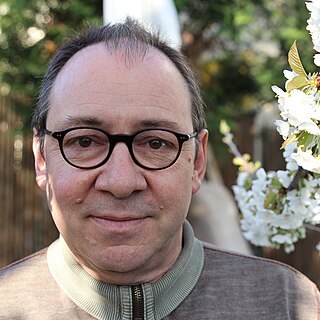
Hervé Pierre is a French actor and theatre director. He joined the Comédie-Française in 2007 and became a member in 2011.

Rebecca Marder is a French film and stage actress.
References
- ↑ "Definition of TROUPE". www.merriam-webster.com. Retrieved 15 June 2020.
- ↑ "troupe - Wiktionary". en.wiktionary.org. Retrieved 15 June 2020.
- ↑ "Troupe definition and meaning". Collins English Dictionary. Retrieved 14 December 2021.
- ↑ "Theatre company definition and meaning". Collins English Dictionary. Retrieved 14 December 2021.
- ↑ Jones, Corey H. (6 June 2014). "Why regional theater companies are forsaking their once-mighty resident acting ensembles". Colorado Public Radio. Retrieved 14 December 2021.
- ↑ "Our Company". Everyman Theatre. Retrieved 14 December 2021.
- ↑ "About". State Theatre Company. Retrieved 14 December 2021.
- ↑ Rines, George Edwin, ed. (1920). . Encyclopedia Americana .